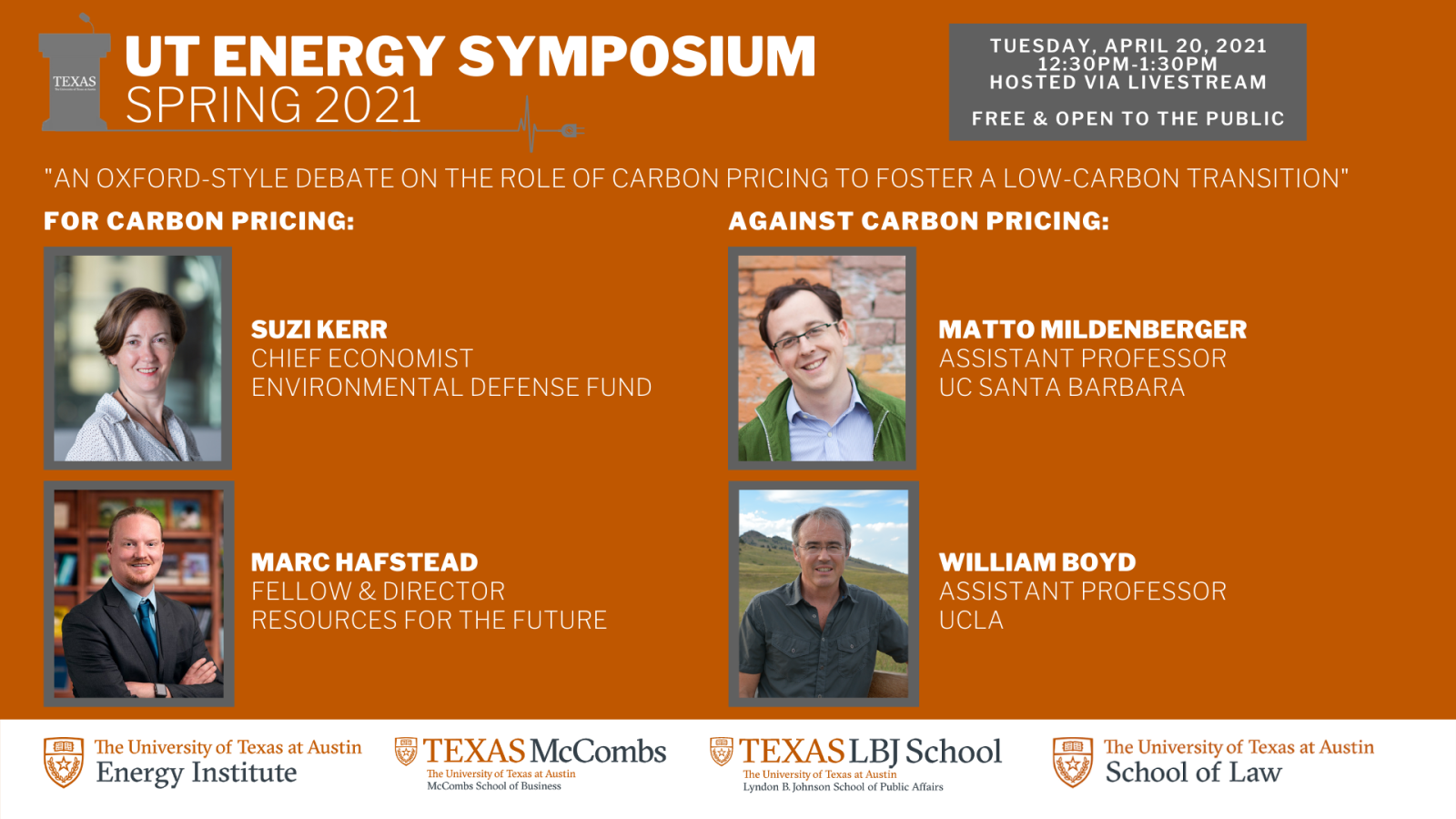
*Note: This talk will be presented remotely via Zoom and on the Energy Institute's YouTube channel. See access details after the bio.
Abstract: Climate advocates disagree how crucial it is to have a price on carbon guide a low-carbon transition. In this special edition of the University of Texas Energy Symposium, we have four participants debate the need for a carbon price, and (you) the attendees get to vote on the winner.
In advance of the upcoming Carbon Price Debate for the University of Texas at Austin's Energy Symposium for April 20, 2021, please evaluate the following debate question:
Should a price on carbon (either as a carbon tax or through a cap and trade program) be at the center of plans to transition the U.S. economy to net zero carbon emissions by mid century?
Click here to vote AFTER the debate on if you think the answer to the question is yes, no, or select that you are uncertain.
Suzi Kerr Bio: Suzi Kerr is the Chief Economist at Environmental Defense Fund. She was, until May 2019, a Senior Fellow, and from 1998 - 2009 Founding Director, at Motu Research in New Zealand. She graduated from Harvard University in 1995 with a PhD in Economics. She has also worked at the University of Maryland at College Park, Resources for the Future (USA), and the Joint Center for the Science and Policy of Global Change at MIT. She was a Visiting Professor at Stanford University for the 2009/10 year, and at the University of the Andes in Bogotá, Colombia in the first half of 2014. In 2018, she was President of the Australasian Agricultural and Resource Economics Society. Her research work focuses on domestic and international climate-change mitigation policy with special emphasis on emissions pricing and land use. She is the leader of the international ‘Climate Teams’ initiative. She is a member of the Advisory Boards for the Climate Econometrics group at Oxford and the International Emissions Trading Association ‘Markets for Natural Climate Solutions’ initiative.
Marc Hafstead Bio: Marc Hafstead joined RFF in 2013 from Stanford University. His research focuses on the evaluation and design of climate and energy policies. With Stanford Professor and RFF University Fellow Lawrence H. Goulder, he wrote Confronting the Climate Challenge: US Policy Options (Columbia University Press) to evaluate the environmental and economic impacts of carbon taxes, cap-and-trade programs, clean energy standards, and gasoline taxes using a sophisticated multi-sector model of the United States.
Matto Mildenberger Bio: Matto Mildenberger is an assistant professor of political science at the University of California Santa Barbara. His research explores the politics of climate change here in the United States and around the world. Matto's latest book Carbon Captured: How Labor and Business Control Climate Politics examines the politics of carbon pricing around the world, and is available from MIT Press.
William Boyd Bio: William Boyd is Professor and Michael J. Klein Chair in Law at UCLA School of Law and Professor at UCLA’s Institute of the Environment and Sustainability. His primary research and teaching interests are in energy law and regulation, climate change law and policy, and environmental law. Professor Boyd continues to be actively involved in climate, energy, and environmental policy matters at multiple levels of governance. Since 2009, he has served as the Project Lead for the Governors' Climate and Forests Task Force (GCF), a unique subnational collaboration of 38 states and provinces from Brazil, Colombia, Ecuador, Indonesia, Ivory Coast, Mexico, Nigeria, Peru, Spain, and the United States that is working to develop regulatory frameworks to reduce emissions from deforestation and land use. Boyd is also the founding Director of the Laboratory for Energy & Environmental Policy innovation (LEEP), a policy innovation lab based in Boulder, Colorado that works with partners around the world to develop and support real-time policy experiments, establish robust networks for learning and exchange, and contribute to effective and durable policy outcomes.
Note: This talk will be presented remotely via Zoom Webinar and on the Energy Institute's YouTube channel. If using Zoom, viewers must register for an account with Zoom and log in to Zoom using that registration in order to use the meeting link and participate. Faculty, students and staff of UT, please use your personal UT Zoom account.
Please click the Zoom link below to join the webinar:
https://utexas.zoom.us/s/96723392808
To view the talk on YouTube, there are two options:
-
Click: https://www.youtube.com/user/utenergyinstitute/ to take you to the HOME page of the Energy Institute’s YouTube page.
The Webinar will be listed as a video thumbnail with the word “LIVE NOW” in the window. Click on that thumbnail.
Then if needed, select the “Live Streams” option next to “All Videos”. The Webinar will be listed as a video thumbnail with the word “LIVE NOW” in the window. Click on that thumbnail to watch the video.
If you do not see the video with either of the options above, the webinar might not be yet started. Also, you might need to refresh your browser to see the option for the live video.
Click here to VOTE AFTER the debate on whether you think carbon prices are needed for a low-carbon transition.

